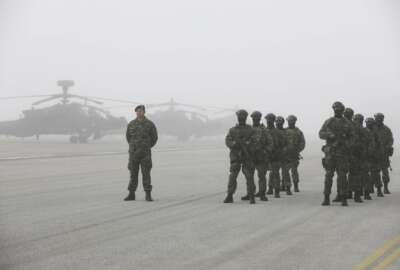

The bill also gives more money to the National Guard for emergency deployments.
The nation’s largest ever spending bill will hold $10.5 billion for the Defense Department to keep the National Guard staffed and protected, insulate key companies from the economic downturn and find treatments for the coronavirus.
The $2 trillion bill, which bails out industries affected by COVID-19 and provides a one-time stipend for some Americans, puts more than $4.9 billion into the Pentagon’s health operations.
About $1.8 billion of that will go to healthcare for military members, dependents and retirees. The military currently has a higher coronavirus infection rate than the civilian population. The number of service members infected with the disease more than doubled since Monday. As of Thursday, 280 service members, 134 civilians, 98 dependents and 62 contractors have contracted the virus.
The bill gives the private sector $1.1 billion to help with any gaps in providing healthcare to service members and their families.
A total of $1.6 billion will go to procuring additional medical equipment and physical protective equipment for medical personnel and disease response. DoD is in the process of transferring 5 million N95 masks to civilian agencies and hospitals.
About $1.6 billion of the health appropriations will go to direct medical care, expanding military treatment facilities and ensuring maximum capacity in hospitals.
The last $415 million will go to researching the development of vaccines, anti-virals, 24/7 lab operations and diagnostics of tests.
The bill sets aside $1.5 billion of the $10.5 billion for the National Guard. The money will be used for domestic or international deployments in response to coronavirus. Nearly 11,400 National Guard members are operating in all 50 states, three territories and in DC delivering food, supporting healthcare providers, assisting with tests and more. National Guard Bureau Chief Gen. Joseph Lengyel said he expects tens of thousands of Guardsmen will be deployed in response to coronavirus.
The stimulus bill gives $713.6 million for DoD operations, which includes the deployment of the hospital ships USNS Comfort and USNS Mercy to the east and west coasts. Those ships will take on trauma patients since quarters are tight and not conducive for the care of infectious disease. The hope is to free more room in civilian hospitals for COVID-19 patients.
That money will also pay for supply for the ships and other increased medical operations and deployments.
The bill gives DoD $300 million to bolster its IT equipment and increase bandwidth. The Pentagon and other military installations are maximizing teleworking to avoid the spread of the virus.
Finally, the bill helps prop up the defense industry with $2.45 billion, especially now that the government is invoking the Defense Production Act (DPA), which forces companies to provide goods and services in response to COVID-19 upon request.
An even $1 billion will go to accessing materials through DPA for pandemic recovery. The other $1.45 billion goes to the Defense Working Capital Funds to mitigate the impact of COVID-19 on production lines, supply chains, military depots and labs.
The stimulus gives some special authorities during the COVID-19 emergency as well. The president may extend the tenure of the top military officials like the service chiefs, the leaders of the Reserves and the National Guard. That comes into play for people like Air Force Chief of Staff Gen. David Goldfein, who is set to retire this summer.
The bill also removes the $1 billion cap on advanced billings for the Defense Working Capital Funds and removes incurred cost limits on progress payments to improve cash flow to companies.
The legislation waives restrictions on some other transaction authorities — a method of acquisition that circumvents federal acquisition rules for fast procurement — to “improve defense industrial base liquidity, particularly among small businesses, in its response to COVID-19,” a summary of the bill states.
Copyright © 2024 Federal News Network. All rights reserved. This website is not intended for users located within the European Economic Area.
Scott Maucione is a defense reporter for Federal News Network and reports on human capital, workforce and the Defense Department at-large.
Follow @smaucioneWFED


